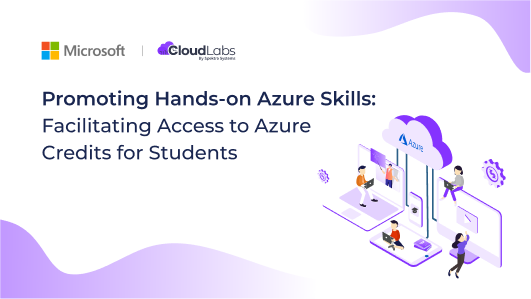In the fast-paced digital landscape of today, cloud computing has become a fundamental pillar across various industries. As students eagerly embrace the vast opportunities offered by the cloud, providing them with an enriching and practical learning experience becomes paramount. This blog aims to delve into the importance of Azure Credits in empowering students with practical learning. Furthermore, we will explore how CloudLabs can effectively address the common challenges associated with managing Azure subscriptions at scale, ultimately empowering students to maximize their learning potential.
Why are Azure Credits Important?
Azure Credits play a pivotal role in student education on the Microsoft Azure platform. They serve as currency, granting students practical access to a diverse range of Azure services vital for their IT learning. Allocating Azure Credits to students brings forward several notable advantages:
Unrestricted Learning: Educational institutions can offer access to Azure services to students without the need for signing up for Azure Trial or Azure for Students, thereby eliminating the requirement for credit card validation and circumventing the associated challenges. This ensures equal opportunities for all students to learn, free from the restrictions and complications that come with signing up for these programs.
Hands-on Learning: Azure Credits enable students to engage in hands-on experiences with a wide range of Azure services. This empowers them to develop practical knowledge and skills aligned with their curriculum, fostering a deeper understanding of various technologies and solutions within the Azure ecosystem.
Career Readiness: Allocating Azure credits to students and promoting resource management within a predefined credit limit allows them to develop practical expertise in Azure cost management, a skill in high demand in the industry. This valuable skill enhances their employability by demonstrating their proficiency in optimizing cloud usage and reducing expenses, making them more competitive in job interviews.
How to get Azure Credits?
There are several different ways you can get credits and start saving on your Azure bill. These options provide various opportunities for individuals and organizations to access Azure credits:
1. Azure for Students:
Full-time students in STEM-related fields at accredited educational institutions can benefit from Azure for Students. By signing up with their school email address, students receive $100 in credits to enhance their career and build Azure skills. They also gain access to learning paths, labs, and professional developer tools.
While Azure for Students offers immense value, institutions and students often find themselves grappling with various challenges throughout the process of procuring and utilizing the program benefits. To read more on the limitations of the Azure for Students program, read our blog: Azure for Students: Navigating Credit Limitations and Potential Solutions
2. Azure Free Account:
With an Azure free account, you can access several popular Azure services at no cost. Additionally, you receive a $200 credit. It’s important to note that while the free account lasts for 12 months, the credits must be used within the first 30 days. This option allows you to explore Azure without a long-term commitment.
Challenges with Azure Credits for Students in an Educational Institution
Limited access: Azure credits obtained through Azure Trials or Azure for Students often come with limitations on credit amounts, expiration, and access to certain services. These restrictions can impede students’ hands-on experience, hindering the development of practical skills and limiting their acquisition of real-world experience. Overcoming these limitations is crucial to provide students with broader access and opportunities to explore and experiment with a wide range of Azure services.
Lack of Visibility and Monitoring: The lack of effective monitoring of Azure Credit usage increases the likelihood of students depleting their Azure Credits during ongoing courses. Without proper oversight, students may inadvertently exhaust their credits, resulting in disruptions to their learning process. Similarly, institutions lack visibility into students’ account details, such as resource costs and remaining credits per student hindering effective monitoring of students’ progress.
Inadequate Tracking and Budget Forecasting Reports: The absence of comprehensive reports summarizing resource and cost usage across semesters makes it difficult to track expenses accurately and forecast budget adequacy. Robust reporting mechanisms are necessary for data-driven decision-making and optimizing resource allocation.
Subscriptions and tenant management: Managing individual subscriptions and tenants for each student can be a complex and time-consuming task. With each student having their own Azure tenant and subscription, it becomes challenging to monitor and control their activities effectively. This decentralized approach can result in difficulties in tracking student progress, identifying potential issues, and ensuring compliance with institutional policies. It also adds administrative overhead, as administrators need to manage multiple subscriptions and tenants separately.
Cumbersome signup processes: Free trial programs or Azure for Students initiatives often involve repetitive signups and credit card validation. These cumbersome signup processes can be time-consuming and create barriers for students. Additionally, the risk of credit card requirements may deter students from enrolling.
Unlocking the Potential: CloudLabs Managed Azure Credits
CloudLabs offers a comprehensive solution to address the complexities associated with allocating and managing Azure credits at scale, providing educational institutions with a multitude of benefits. By leveraging CloudLabs Managed Labs and centralizing subscription management, institutions can effectively control their budget, reduce IT costs, and simplify the onboarding process for students.
Efficient Monitoring and Alerts: CloudLabs implements a centralized student account management system, providing professors with easy access to students’ account details, including resource and credit consumption and alerts. This centralized approach enables educational institutions to allocate budgets to students for their courses based on resource costs and remaining credits, facilitating effective budget management. It streamlines administrative tasks, enhances control, and ensures transparency in resource allocation.
Daily Report: CloudLabs provides an automated BI tool that generates daily cost reports and budgets for each student. These reports offer transparency into resource and credit consumption, allowing students and educational institutions to track expenses accurately. With real-time insights and budget forecasting, and automated alerts institutions can make informed decisions and optimize resource allocation to maximize the benefits of Azure Credits.
Easy Credit Extensions: CloudLabs offers credit extensions for students. This ensures that they have sufficient Azure Credits to complete their courses without any interruptions. By extending the credit duration, students can fully explore and experiment with Azure services, enhancing their practical skills and understanding of cloud computing.
Enhanced Security: CloudLabs prioritizes security by providing isolated sandbox environments for students within their EDU accounts. These sandbox environments minimize the attack surface, ensuring the security of students, faculties, and the organization. By implementing strict security measures, CloudLabs safeguards against threats and ensures a safe learning environment for all stakeholders.
Reduce Management Overhead: CloudLabs leverages Infrastructure as Code (IaC) to automate the provisioning and management of resources within the student environments. This eliminates the need for manual configuration and ensures consistency across multiple courses. By embracing IaC principles, CloudLabs enables efficient resource utilization and reduces the risk of human errors, leading to cost control for students enrolled in multiple cloud courses.
24/7 Support: CloudLabs offers 24/7 support to institutions. This ensures efficient lab experiences and enables prompt resolution of any technical issues that may arise. With dedicated support, educational institutions can focus on delivering quality education while relying on CloudLabs’ expertise to address any concerns.
Conclusion:
In conclusion, Azure Credits play a pivotal role in empowering students and facilitating a seamless learning experience in the cloud. By facilitating access to Azure credits, educational institutions play a crucial role in shaping the future generation of cloud professionals. Empowering students with hands-on Azure skills not only enhances their employability but also contributes to the overall growth and innovation in the technology landscape.
To learn more about how CloudLabs can benefit your institution and empower your students, visit our website.
Discover the potential solutions that CloudLabs can provide to your institution, enabling your students to make the maximum use of ‘Azure for Students’ benefits.








